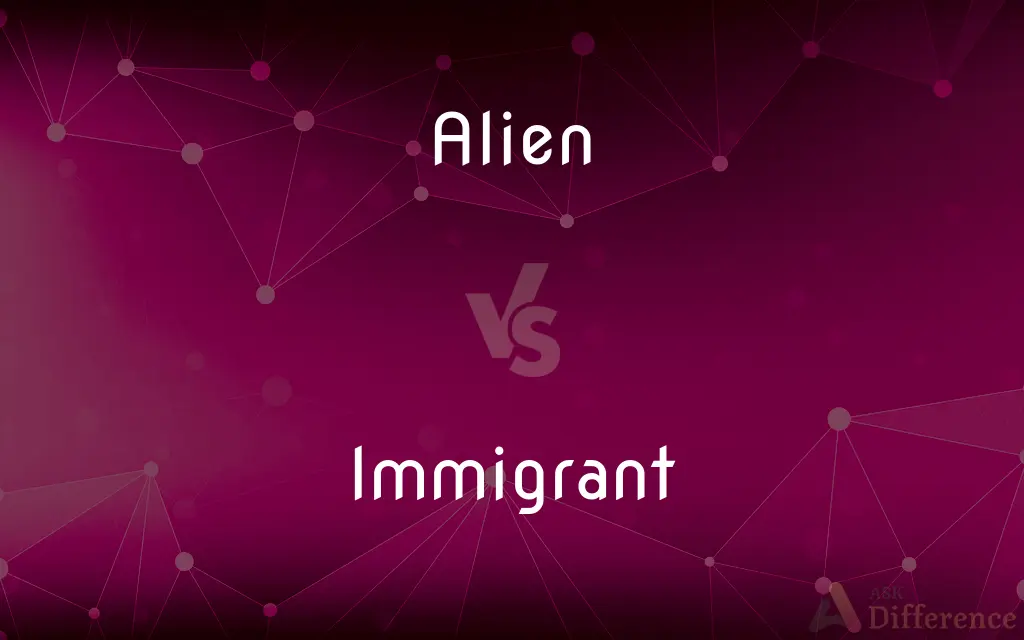Alien vs. Immigrant — What's the Difference?
By Tayyaba Rehman — Updated on September 23, 2023
An "alien" is a foreigner who is not a naturalized citizen of the country where they are living, and the term often carries a legal context. An "immigrant" is someone who has moved to another country with the intention of residing there permanently.

Difference Between Alien and Immigrant
Table of Contents
ADVERTISEMENT
Key Differences
The terms "alien" and "immigrant" both refer to individuals who are not native to the country in which they are currently residing. However, the term "alien" often carries legal and sometimes negative connotations, as it is used to describe someone who is not a citizen and may not have the legal right to stay in that country. On the other hand, "immigrant" is a more neutral term and generally refers to someone who has moved to a new country with the intention of making it their permanent home.
"Alien" is frequently used in legal contexts to denote someone who may or may not have the right to reside or work in a country, and could potentially be subject to deportation. It's a term that cuts across various types of foreign status, from tourists to undocumented individuals. "Immigrant," meanwhile, typically suggests a more settled status, indicating that the individual has made a long-term commitment to their new country, often seeking employment and building a life there.
The term "alien" can sometimes be perceived as dehumanizing, given its alternate meaning referring to extraterrestrial life and its often legalistic use. "Immigrant," however, tends to humanize the individual, highlighting the act of immigration as a human endeavor often undertaken for better opportunities and a better life.
In summary, while "alien" is often a catch-all term that refers to any foreigner in a country, irrespective of their legal status, "immigrant" tends to focus on those who have moved to another country with the intention of permanent residency. Both terms identify non-natives, but they come with different connotations and implications.
Comparison Chart
Connotation
Often legal, sometimes negative
Generally neutral
ADVERTISEMENT
Legal Status
Varies, may not have right to stay
Usually aims for permanent residency
Context
Legal and administrative documents
General discussion and legal documents
Duration of Stay
Not necessarily long-term
Intended to be long-term
Permanence
Not implied
Implied
Compare with Definitions
Alien
A foreigner not naturalized in the country where they are living.
The alien was seeking a visa to extend his stay.
Immigrant
Someone who moves to another country intending to live there permanently.
The immigrant arrived with hopes of a better life.
Alien
Often used in legal contexts.
The court determined the alien was subject to deportation.
Immigrant
Usually seeking long-term residency.
The immigrant applied for a green card.
Alien
May not have the legal right to stay.
As an alien, she had to frequently update her immigration status.
Immigrant
A neutral term focused on the act of moving.
Immigrant communities often bring diverse cultures.
Alien
A catch-all term for non-citizens.
The alien registration form was complicated.
Immigrant
Generally aims for legal status.
The immigrant was in the process of naturalization.
Alien
Owing political allegiance to another country or government; foreign
Alien residents.
Immigrant
Often used in discussions about migration policies.
The immigrant population was a topic in the election.
Alien
Belonging to, characteristic of, or constituting another and very different place, society, or person; strange.
Immigrant
A person who comes to live permanently in a foreign country
An immigrant village
Immigrant workers
They found it difficult to expel illegal immigrants
Alien
Dissimilar, inconsistent, or opposed, as in nature
Emotions alien to her temperament.
Immigrant
A person who leaves one country to settle permanently in another.
Alien
An unnaturalized foreign resident of a country. Also called noncitizen.
Immigrant
An organism that establishes itself in an area where it previously did not exist.
Alien
A person from another and very different family, people, or place.
Immigrant
Of or relating to immigrants or the act of immigrating.
Alien
A person who is not included in a group; an outsider.
Immigrant
A non-native person who comes to a country from another country to permanently settle there.
Alien
A creature from outer space
Science fiction about an invasion of aliens.
Immigrant
A plant or animal that establishes itself in an area where it previously did not exist.
Alien
(Ecology) An organism, especially a plant or animal, that occurs in or is naturalized in a region to which it is not native.
Immigrant
Of or relating to immigrants or the act of immigrating.
Alien
To transfer (property) to another; alienate.
Immigrant
One who immigrates; one who comes to a country for the purpose of permanent residence; - correlative of emigrant.
Alien
A person, animal, plant, or other thing which is from outside the family, group, organization, or territory under consideration.
Immigrant
A person who comes to a country where they were not born in order to settle there
Alien
A person in a country not their own.
Alien
Any life form of extraterrestrial or extradimensional origin.
Alien
One excluded from certain privileges; one alienated or estranged.
Alien
Not belonging to the same country, land, or government, or to the citizens or subjects thereof; foreign.
Alien subjects, enemies, property, or shores
Alien
Very unfamiliar, strange, or removed.
Principles alien to our religion
Alien
Pertaining to extraterrestrial life; typical of an extraterrestrial creature.
Alien
(transitive) To estrange; to alienate.
Alien
(law) To transfer the ownership of something.
Alien
Not belonging to the same country, land, or government, or to the citizens or subjects thereof; foreign; as, alien subjects, enemies, property, shores.
Alien
Wholly different in nature; foreign; adverse; inconsistent (with); incongruous; - followed by from or sometimes by to; as, principles alien from our religion.
An alien sound of melancholy.
Alien
A foreigner; one owing allegiance, or belonging, to another country; a foreign-born resident of a country in which he does not possess the privileges of a citizen. Hence, a stranger. See Alienage.
Alien
One excluded from certain privileges; one alienated or estranged; as, aliens from God's mercies.
Aliens from the common wealth of Israel.
Alien
To alienate; to estrange; to transfer, as property or ownership.
The prince was totally aliened from all thoughts of . . . the marriage.
Alien
A person who comes from a foreign country; someone who does not owe allegiance to your country
Alien
Anyone who does not belong in the environment in which they are found
Alien
A form of life assumed to exist outside the Earth or its atmosphere
Alien
Transfer property or ownership;
The will aliened the property to the heirs
Alien
Arouse hostility or indifference in where there had formerly been love, affection, or friendliness
Alien
Not contained in or deriving from the essential nature of something;
An economic theory alien to the spirit of capitalism
The mysticism so foreign to the French mind and temper
Jealousy is foreign to her nature
Alien
Being or from or characteristic of another place or part of the world;
Alien customs
Exotic plants in a greenhouse
Exotic cuisine
Alien
Can imply a sense of otherness.
The term alien can sometimes feel dehumanizing.
Common Curiosities
What is an Alien?
An alien is a foreigner who is not a naturalized citizen of the country where they are living.
What is an Immigrant?
An immigrant is someone who moves to another country intending to live there permanently.
Is 'Immigrant' a derogatory term?
Generally, "immigrant" is considered a neutral term.
Can an Alien become an Immigrant?
Yes, an alien can become an immigrant if they move with the intention of permanent residency.
What is the main difference between an Alien and an Immigrant?
The term "alien" often relates to legal status, while "immigrant" usually refers to the intention of permanent residency.
Do Immigrants pay taxes?
Yes, immigrants typically pay taxes as they are usually seeking long-term residency and work.
Is 'Immigrant' a legal term?
While also used in legal contexts, "immigrant" is generally a neutral term.
Can an Alien work legally?
It depends on the type of visa or permit the alien holds.
Can an Immigrant work legally?
Immigrants often move with the intention of finding work and generally seek legal work status.
Is 'Alien' a legal term?
Yes, "alien" is often used in legal and administrative contexts.
Do Aliens pay taxes?
Aliens may pay taxes depending on their legal status and income in the country.
Can Aliens vote?
Generally, aliens do not have the right to vote in most countries.
How do Aliens become naturalized citizens?
Aliens can apply for naturalization, often after meeting residency and other requirements, to become citizens.
Is 'Alien' a derogatory term?
The term can be perceived as negative or dehumanizing, although it's a legal term.
Can Immigrants vote?
Immigrants may earn the right to vote after becoming naturalized citizens.
Share Your Discovery

Previous Comparison
Also vs. Too
Next Comparison
Laugh vs. LoughAuthor Spotlight
Written by
Tayyaba RehmanTayyaba Rehman is a distinguished writer, currently serving as a primary contributor to askdifference.com. As a researcher in semantics and etymology, Tayyaba's passion for the complexity of languages and their distinctions has found a perfect home on the platform. Tayyaba delves into the intricacies of language, distinguishing between commonly confused words and phrases, thereby providing clarity for readers worldwide.
















































